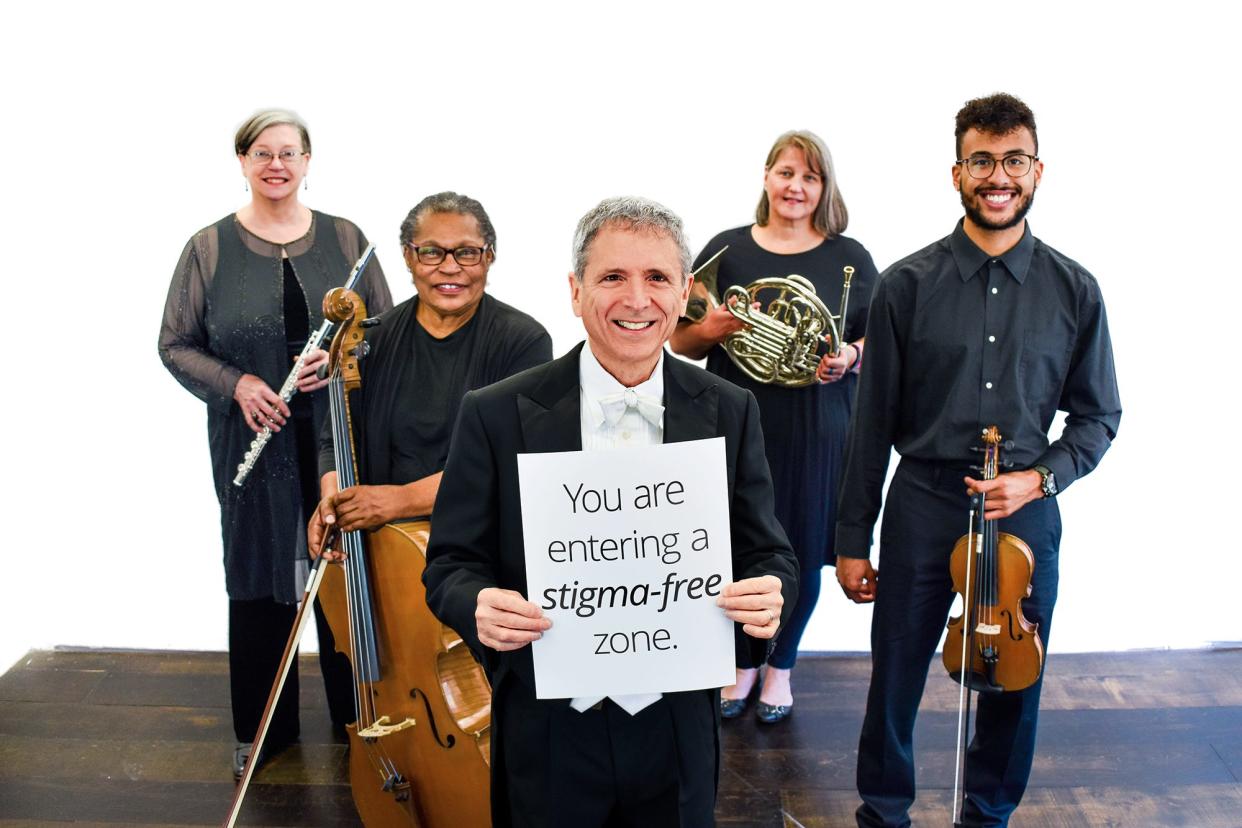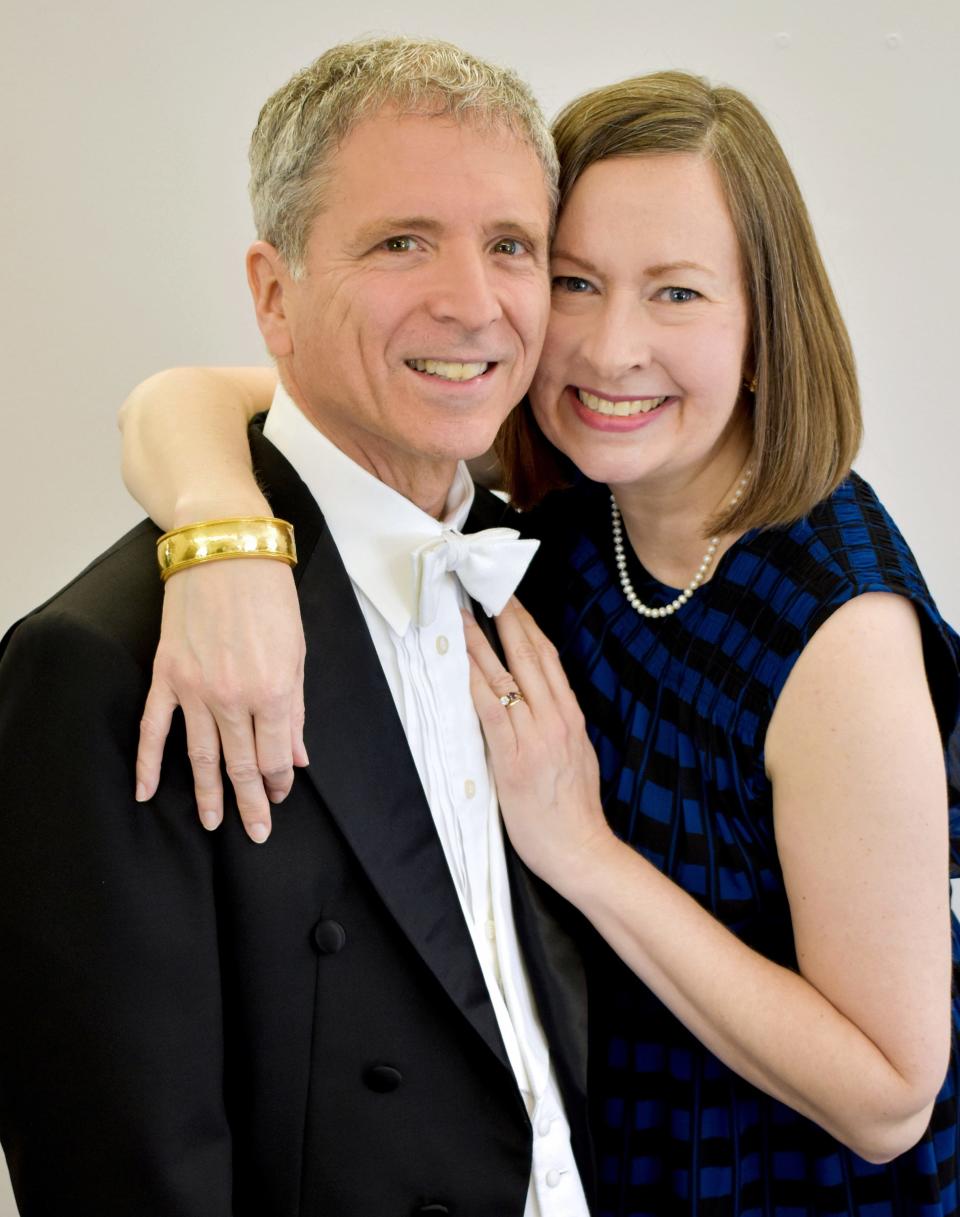Me2/ Orchestra offers mental health comfort zone for musicians and audiences

Shrewsbury violinist Emily Plunkett was looking for a new community music group to join.
With Me2/, she found a New England-based orchestra.
On its Facebook page, Me2/ Orchestra says it is "the world's only classical music organization created for individuals with mental illness and people who support them. Our mission is to erase the stigma surrounding mental health diagnoses through supportive rehearsals and inspiring performances."
Plunkett will be a member of the Me/2 Orchestra for “Stigma-Free at Symphony Hall,” a free concert at 3 p.m. Jan. 23 at Symphony Hall in Boston for audience members with mental illnesses and their allies.
The event will feature both great music and testimonies from musicians living well with mental illness, and audience members are invited to participate in a Q&A session.
The concert also marks Me2/’s 10th year.
"I'm so excited. It's going to be really cool," Plunkett said about the concert.
Rhode Island native
Plunkett is originally from Rhode Island but said she moved to Massachusetts looking for a better job. She is an instrumental teacher at Plymouth elementary schools.
She has played the violin since fifth grade and found out about Me2/ on Facebook around the time she came to Shrewsbury about four months ago.

Me2/'s mission statement also includes that it is a "stigma-free zone."
"They truly mean it. I've played with other groups before and I can tell the difference. Everyone's very welcoming," Plunkett said.
"As a musician, a teacher, and someone battling anxiety/depression/trauma, this orchestra has truly felt the most welcoming out of all the groups I’ve participated in," she said.
Me2/ was founded in 2011 by music director and conductor Ronald Braunstein, whose rising career as a world-class conductor was cut short due to the stigma surrounding his bipolar disorder diagnosis.
According to Me2/ executive director Caroline Whiddon, half of Me2/’s musicians live with a diagnosis including bipolar disorder, schizophrenia, OCD, trauma, depression, addiction or anxiety.
An acclaimed documentary
Me2/ has received national attention over the past two years as a documentary about its work, “Orchestrating Change” by Margie Friedman and Barbara Multer-Wellin, premiered on public television stations across the country.
The film follows Braunstein’s journey from rising classical music star to industry outsider and then high-profile mental health advocate and a mentor for musicians around the country with the support of his wife, Whiddon.

In an announcement about "Stigma-Free at Symphony Hall, Whiddon said the group works to create stigma-free zones in its own rehearsals, backstage, and at other gatherings, so offering the same for audience members was a natural step. Some people living with mental illnesses such as bipolar disorder, PTSD or addiction may have anxiety about the expectations around attending classical music performances.
"We plan to make everyone comfortable at this performance by taking the pressure off the experience of attending a concert,” Whiddon said. “Our philosophy is ‘come any way you can,’ ‘be who you are’ and ‘do what you need to do while you’re here.’”
Me2/ operates several performing ensembles, including orchestras in Boston, Burlington, Vermont, Manchester, New Hampshire, and Portland, Maine, and a Boston-based flute choir. Each group will rehearse for the January concert separately. The ensembles will meet in Boston the day before the show for a full-group rehearsal with Braunstein. The full orchestra is expected to number about 100 musicians.
“We are a large collection of musicians who range greatly in age and ability,” Braunstein said. “I can’t wait to see what happens when we converge at Symphony Hall to play those first few notes. I expect it will be electrifying for us and for our audiences.”
From young violinist to educator
Plunkett said she's been playing the violin since the fifth grade when she took part in a strings program in North Kingston, Rhode Island.
"I decided that I wanted to pursue a career in music education as an opportunity to learn more about music while dedicating my career to pushing for all children to have access to the opportunity to learn a string instrument," she said.
"After a lot of hard work and personal setbacks, I can proudly say that I am an instrumental music teacher in the historic town of Plymouth."
With Me/2's "stigma-free zone" Plunkett said, "it means the world to me as a musician who has anxieties. No matter who you are and what your background is, it feels very welcoming. They even email you what they're planning for the week, so that's very appreciated."
While musicians come from various outposts, the musicians have been able to rehearse in person rather than taking part in Zoom sessions. In Plunkett's case, she's been attending rehearsals in Dorchester. Vaccinations and social distancing are a given.
"It's a huge difference. It's great for people," she said of getting together in-person.
The program for Jan. 23 includes Freedom by Milad Yousufi, the Afghanistan refugee now based in New York City who has made several visits to Worcester schools arranged by Music Worcester.
Familiar selections
Also to be performed will be Barber of Seville Overture by Rossini, The Procession to the Stake from Symphonie Fantastique by Berlioz, Nimrod from Elgar's Enigma Variations, the second movement from the Peer Gynt Suite No.1 by Grieg, and IV Allegro from Beethoven's Fifth Symphony.
That's quite a demanding musical lineup of works. Orchestra members have been practicing on their own at home in addition to attending rehearsals, Plunkett said.
"It's really important for everyone to do their part," she said.
At the end of the concert, she said, "I hope people will take away that regardless of your background anyone can enjoy classical music. You don't have to look a certain way, you don't have to act a certain way to enjoy classical music."
In particular, she hopes the concert will inspire somebody in the audience to perhaps pick up and play an instrument themselves,
"Maybe not everybody, but I'm sure one person will feel inspired to," Plunkett said.
She has her own inspiration. "I am truly excited and grateful for the opportunity to play in Symphony Hall with Me2/. I look forward to being part of Me2/ for years to come," she said.
"Stigma-Free at Symphony Hall” at 3 p.m. Jan. 23 is free. RSVP at bso.org/events/me2-orchestra. The concert follows Symphony Hall COVID safety protocols at at bso.org/safety. Seating is general admission.
The event is sponsored by McLean Hospital. It is supported by partner organizations Boston Symphony Orchestra, Mass Cultural Council, Austen Riggs Center, the Depression & Bipolar Support Alliance of Boston, and Massachusetts Association for Mental Health.
This article originally appeared on Telegram & Gazette: Emily Plunkett of Shrewsbury part of Me2/ "Stigma-Free at Symphony Hall"

